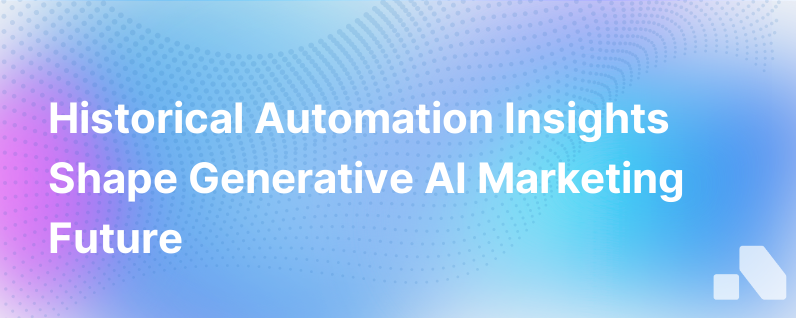
The rollout of automation technologies has radically transformed industries across the board, continually redefining what it means to be productive. From the steam engine's profound impact on the Industrial Revolution to the rise of computer programming that revolutionized data handling, each wave of automation has brought both upheaval and progress. The marketing sector, often at the forefront of leveraging innovations for competitive advantage, is poised on the cusp of another transformative wave: generative artificial intelligence (AI).
The history of automation has invariably taught us a few core lessons that can enlightly predict future advancements and applications of generative AI in marketing. Here is a reflection on automation's journey and what marketers should glean from it as they ready themselves for generative AI’s role in creating and personalizing content at scale.
The Evolution of Automation: A Brief Recap
Automation has always been about doing more with less. The word itself conjures images of steam-powered looms and assembly lines autonomously churning out products. But its essence isn't just mechanical; it's the continuous enhancement of human efforts by machines, evidenced in modern times by software protocols that power complex company operations.
The industrial age set the precedent for machines doing heavy lifting, while the digital age extended this to computation and data analysis. Yet, each iteration has retained a consistent theme: augment human capability, reduce tediousness, and elevate productivity and creativity.
Marketing's adaptation to automation reflects these priorities. Marketing automation began with simple email autoresponders and has evolved to encompass powerful CRM tools, data analytics, chatbots, and more, allowing for increasingly personalized customer journeys.
Generative AI: Automation Reimagined
Generative AI is the latest chapter in the annals of automation, built on the promise of generating novel content, predicting customer behavior, and delivering personalized experiences. Notably, this technology doesn't simply automate repetitive tasks; it’s equipped to create and innovate, learning from inputs to manufacture outputs that previously only human intelligence could achieve.
Lessons from History
Lesson 1: Resilience in Adaptation
Those willing to adapt weathered the changes brought on by historical phases of automation best. For marketers, this means embracing generative AI with an agile mindset. Understanding the technology's capabilities and experimenting with its application will be crucial.
For example, generative AI can craft personalized copy at an unprecedented scale. Content that historically took days to personalize manually can be customized to individual preferences in moments, enabling real-time engagement and opening new opportunities for marketing efficiency and effectiveness.
Lesson 2: Elevating Human Creativity
Every iteration of technological advancement has eliminated certain jobs while creating others. By shifting the workforce away from routine tasks, it has left more room for innovation and creativity. With generative AI handling content creation, marketers can focus more on strategy development, emotional intelligence-driven tasks, and deeper human insights – the aspects that machines can't automate.
Lesson 3: Continuous Learning and Iteration
Each wave of automation has necessitated learning and adaptation not just once but continuously. Generative AI will evolve, and so must the strategies marketers use to implement it. This learning extends beyond how to use new tools to include management, ethical guidelines, and an understanding of new data security and privacy implications.
Lesson 4: Data Quality as Foundation
Data has always been at the core of successful automation – garbage in, garbage out. Quality data is paramount for generative AI; it needs to learn from the best to produce valuable outputs. Marketers must ensure that the data feeding into AI systems is cleaned, structured, and representative to avoid biases and enhance the quality of generated material.
Lesson 5: Ethical Considerations and Public Perception
Just as there were ethical concerns with past forms of automation (like job displacement and poor worker conditions), generative AI brings its own set of ethical considerations. It challenges notions of authenticity, with potential for misuse. Marketers need to navigate these waters carefully, balancing innovation with integrity and regulators' concerns with public sentiment.
Looking Forward: Generative AI in Marketing
Expectations for generative AI in marketing are enormously high. It bids a future where:
- Content is dynamically personalized to each user.
- Creative campaigns are iterated and optimized with lightning speed.
- Market research is conducted in real-time with predictive models providing incredible insights into consumer behavior.
However, to harness generative AI's potential fully, marketers must also develop new skills and mindsets. This includes:
- Nurturing an understanding of how AI models work and can be trained for optimal outcomes.
- Crafting guidelines for responsible use to ensure brand reputation remains intact.
- Fostering partnerships with technology providers to stay ahead of the curve.
Generative AI represents an upcoming shift in the automation paradigm, one that rewards strategic foresight, continuous learning, and adaptive execution. As history has shown us, automation is inevitable; how we prepare for it determines whether we lead the curve or race to catch up.
As professionals at the forefront of generative AI for B2B sales, we at Aomni invite marketers to explore how this transformative technology can redefine their landscapes. It’s time to view generative AI not as a threat but as a collaborator, ready to elevate the industry and those who dare to adapt to new heights.